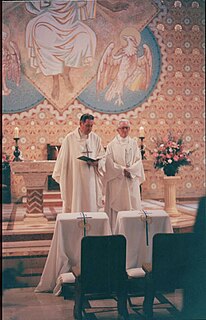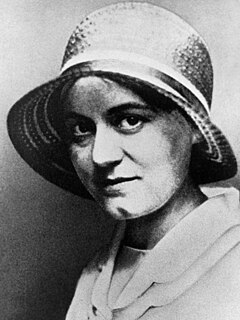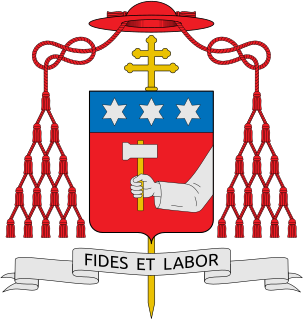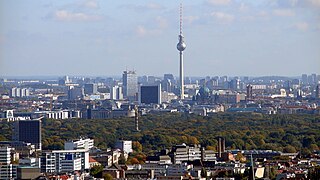
Catholic clergy involvement with the Ustaše covers the role of the Croatian Catholic Church in the Independent State of Croatia (NDH), a Nazi puppet state created on the territory of Axis-occupied Yugoslavia in 1941.

Father Robert Andrew Graham, SJ was an American Jesuit priest and World War II historian of the Catholic Church. He was a vigorous defender of Pope Pius XII over accusations that he had failed to do what he could to defend the Jews and others persecuted by the Nazis.
Pope Pius XII and Poland includes Church relations from 1939–1958. Pius XII became Pope on the eve of the Second World War. The invasion of predominantly Catholic Poland by Nazi Germany in 1939 ignited the conflict and was followed soon after by a Soviet invasion of the Eastern half of Poland, in accordance with an agreement reached between the dictators Joseph Stalin and Adolf Hitler. The Catholic Church in Poland was about to face decades of repression, both at Nazi and Communist hands. The Nazi persecution of the Catholic Church in Poland was followed by a Stalinist repression which was particularly intense through the years 1946–1956. Pope Pius XII's policies consisted in attempts to avoid World War II, extensive diplomatic activity on behalf of Poland and encouragement to the persecuted clergy and faithful.

Cesare Vincenzo Orsenigo was Apostolic Nuncio to Germany from 1930 to 1945, during the rise of Nazi Germany and World War II. Along with the German ambassador to the Vatican, Diego von Bergen and later Ernst von Weizsäcker, Orsenigo was the direct diplomatic link between Pope Pius XI and Pope Pius XII and the Nazi regime, meeting several times with Adolf Hitler directly and frequently with other high-ranking officials and diplomats.
The relations between Pope Pius XII and Judaism have long been controversial, especially those questions that surround Pope Pius XII and the Holocaust. Other issues involve Pius's Jewish friendships and his attitude towards the new state of Israel.
The Jewish orphans controversy was a dispute about the custody of Jewish children after the end of World War II. Some Jewish children had been baptized while in the care of Catholic institutions or individual Catholics during the war. Such baptisms allowed children to be identified as Catholics to avoid deportation and incarceration in concentration camps, and likely death in the Holocaust. After the end of hostilities, Catholic Church officials, either Pope Pius XII or other prelates, issued instructions for the treatment and disposition of such Jewish children, some but not all of whom were now orphans. The rules they established, the authority that issued those rules, and their application in specific cases is the subject of investigations by journalists and historians.

The start of the pontificate of Pius XII occurred at the time of the Second World War and the Nazi Holocaust, which saw the industrialized mass murder of millions of Jews and others by Adolf Hitler's Germany. Pius employed diplomacy to aid the victims of the Nazis during the war and, through directing his Church to provide discreet aid to Jews and others, saved hundreds of thousands of lives. Pius maintained links to the German Resistance, and shared intelligence with the Allies. His strongest public condemnation of genocide was, however, considered inadequate by the Allied Powers, while the Nazis viewed him as an Allied sympathizer who had dishonoured his policy of Vatican neutrality.
Pope Pius XII's response to the Roman razzia or mass deportation of Jews on October 16, 1943 is a significant issue relating to Pope Pius XII and the Holocaust. Under Mussolini, no policy of abduction of Jews had been implemented in Italy. Following the capitulation of Italy in 1943, Nazi forces invaded and occupied much of the country, and began deportations of Jews to extermination camps. Pius XII protested at diplomatic levels, while several thousand Jews found refuge in Catholic networks, institutions and homes across Italy - including in the Vatican City and Pope Pius' Summer Residence. The Catholic Church and some historians have credited this rescue in large part to the direction of Pope Pius XII, however, Susan Zuccotti researched the matter in detail and discovered that although the pope was aware of The Holocaust, he did not issue a rescue order. Zuccotti states that there is, in fact, "considerable evidence of papal disapproval of the hiding of Jews and other fugitives in Vatican properties."
Pope Pius XII's 1942 Christmas address was a speech delivered by Pope Pius XII over Vatican Radio on Christmas 1942. It is notable for its denunciation of the extermination of people on the basis of race, and followed the commencement of the Nazi Final Solution program to exterminate the Jews of Europe. The significance of the denunciation is a matter of scholarly debate.

Dr. Carl-Ludwig Diego von Bergen was the ambassador to the Holy See from the Kingdom of Prussia (1915–1918), the Weimar Republic (1920–1933), and Nazi Germany (1933–1943), most notably during the negotiation of the Reichskonkordat and during the Second World War.

Foreign relations of Pope Pius XII extended to most of Europe and a few states outside Europe. Pius XII was pope from 1939 to 1958, during World War II and the beginning of the Cold War.
Andrea Cassulo was an archbishop of the Roman Catholic Church and a representative of the Holy See in Egypt, Canada, Romania and Turkey from 1921 to 1952. A significant figure in Catholic resistance to Nazism, for his efforts to protect Jews during the Nazi Holocaust, Cassulo was accorded the title of "Righteous among the nations by Yad Vashem, Israel's Holocaust memorial.

Vatican City pursued a policy of neutrality during World War II, under the leadership of Pope Pius XII. Although the city of Rome was occupied by Germany from 1943 and the Allies from 1944, Vatican City itself was not occupied. The Vatican organised extensive humanitarian aid throughout the duration of the conflict.
Pietro Tacchi Venturi was a Jesuit priest and historian who served as the unofficial liaison between Benito Mussolini, the Fascist leader of Italy from 1922 to 1943, and popes Pius XI and Pius XII. He was also one of the architects of the 1929 Lateran Treaty, which ended the "Roman Question", and recognized the sovereignty of Vatican City, which made it an actor of international relations. A claimed attempt to assassinate Venturi with a paper knife, one year before the treaty's completion, made headlines around the world. Venturi had begun the process of reconciliation by convincing Mussolini to donate the valuable library of the Palazzo Chigi to the Vatican.
The public statements of Pope Pius XII on the Holocaust, or lack thereof, are one of the most controversial elements of the historical debate about Pope Pius XII and the Holocaust. Pius XII's statements have been scrutinized as much, if not more, than his actions during the same period. Pius XII's statements, both public and private, are quite well documented in the Vatican Secret Archives; eleven volumes of documents from his papacy were published between 1965 and 1981 in Actes et documents du Saint Siège relatifs à la Seconde Guerre Mondiale.

The Assisi Network was an underground network in Italy established by Catholic clergy to protect Jews during the Nazi Occupation. The churches, monasteries, and convents of Assisi served as a safe haven for several hundred Jews.

Several Catholic countries and populations fell under Nazi domination during the period of the Second World War (1939–1945), and ordinary Catholics fought on both sides of the conflict. Despite efforts to protect its rights within Germany under a 1933 Reichskonkordat treaty, the Church in Germany had faced persecution in the years since Adolf Hitler had seized power, and Pope Pius XI accused the Nazi government of sowing 'fundamental hostility to Christ and his Church'. Pius XII became Pope on the eve of war and lobbied world leaders to prevent the outbreak of conflict. His first encyclical, Summi Pontificatus, called the invasion of Poland an "hour of darkness". He affirmed the policy of Vatican neutrality, but maintained links to the German Resistance. Despite being the only world leader to publicly and specifically denounce Nazi crimes against Jews in his 1942 Christmas Address, controversy surrounding his apparent reluctance to speak frequently and in even more explicit terms about Nazi crimes continues. He used diplomacy to aid war victims, lobbied for peace, shared intelligence with the Allies, and employed Vatican Radio and other media to speak out against atrocities like race murders. In Mystici corporis Christi (1943) he denounced the murder of the handicapped. A denunciation from German bishops of the murder of the "innocent and defenceless", including "people of a foreign race or descent", followed.



















